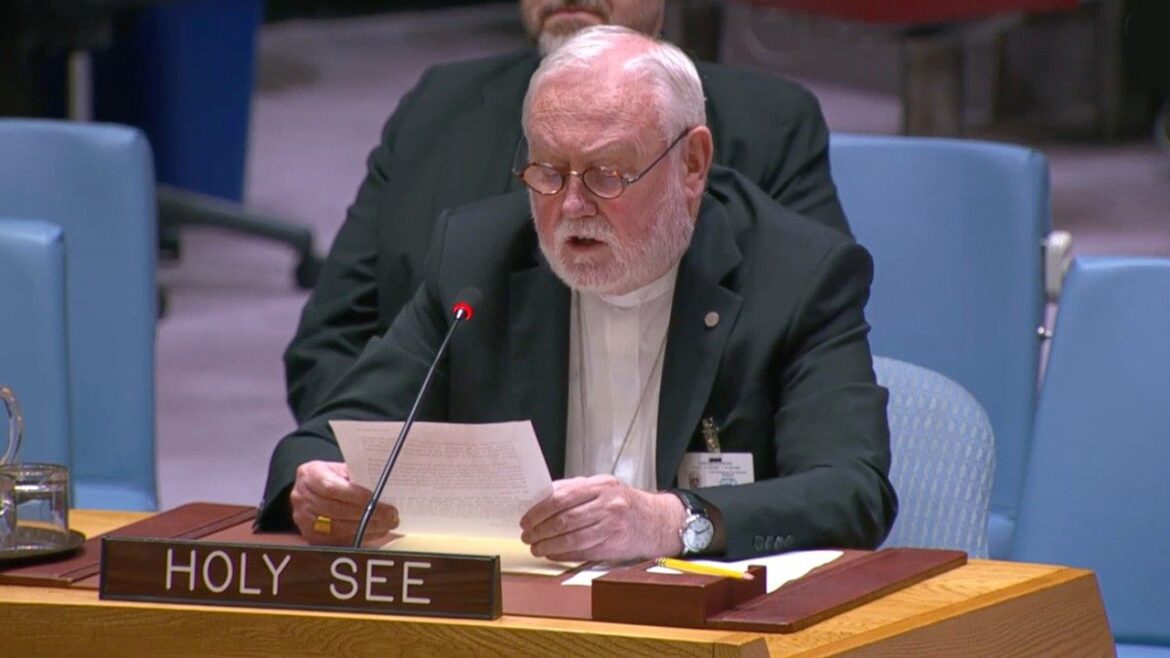
Addressing the UN Security Council, Archbishop Paul Richard Gallagher calls for a moratorium on lethal autonomous weapons and highlights the need for a human-centered approach to artificial intelligence.
By Linda Bordoni
The need for urgent measures to ensure that the rapid development of artificial intelligence (AI) remains anchored in respect for human dignity and directed to the common good was at the heart of Archbishop Paul Richard Gallagher’s speech at the UN Security Council during a debate on Artificial Intelligence and International Peace and Security.
Speaking on Wednesday, the Vatican Secretary for Relations with States and International Organisations, warned that while AI carries the potential to advance peace, development and human rights, it also poses serious risks when detached from ethical considerations.
“The digital revolution, particularly in the field of AI, is having a deep impact on areas such as education, employment, art, healthcare, governance, the military, and communication,” Archbishop Gallagher said. He noted that these innovations can contribute to realising the very aspirations that inspired the founding of the United Nations 80 years ago.
At the same time, he cautioned, “if the development and use of AI are not firmly anchored in respect for human dignity and the pursuit of the common good, they risk becoming instruments of division and aggression, with the potential to fuel further conflict.”
Call for a moratorium on Lethal Autonomous Weapons
Among the most pressing concerns raised was the deployment of lethal autonomous weapon systems (LAWS), which the Archbishop described as raising “grave legal, security, humanitarian, and ethical concerns for the international community, because they lack the unique human capacity for moral judgment and ethical decision-making.”
For this reason, he affirmed, “the Holy See strongly supports the adoption of an immediate moratorium on the development or use of LAWS, as well as a legally binding instrument to ensure that decisions over life and death remain under meaningful human control.”
Risks of an AI-driven arms race
Archbishop Gallagher also pointed to the dangers of an emerging arms race involving the integration of AI into military systems, including space assets and missile defence systems. Such trends, he said, risk “altering the nature of weapons and warfare, creating an unprecedented level of uncertainty, due to the possibility of miscalculation.”
Particularly troubling, he warned, is the prospect of AI being incorporated into nuclear command and control structures. “This introduces new unknown risks that extend far beyond the already fragile and morally troubling logic of nuclear deterrence,” he said.
A human-centred Approach
Thus, the Holy See representative urged the Security Council to assume its responsibility to monitor scientific and technological progress closely, ensuring that peace and security debates take into account both opportunities and dangers.
“In order to address these pressing issues, the Holy See calls for a human-centred approach to the development and use of emerging technologies,” he said.
“It should also recognise that certain applications, such as technology that replaces human judgment in matters of life and death, cross inviolable boundaries that must never be breached.”
Concluding his intervention, Archbishop Gallagher reminded delegates that international cooperation is essential to prevent AI from becoming a driver of division or destruction. Instead, he said, it must be oriented towards the service of humanity, peace, and justice.

